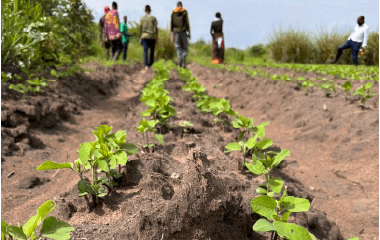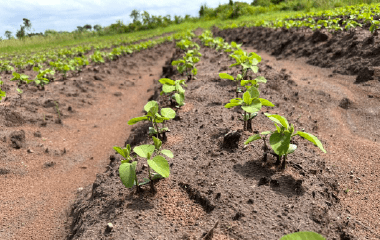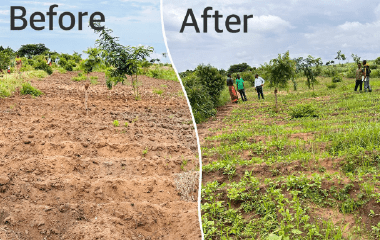Creating Positive Impact through the "Virtuous Farming Project" in Malawi
Core to ETG’s vision and purpose is the desire to create lasting and meaningful impacts in the lives of all our stakeholders. The group has developed numerous projects to illustrate this commitment, one being the 'Virtuous Farming Project' in Malawi.
This initiative is dedicated to fairness, equality, and the promotion of social development in the lives of farming communities. Built around three pillars—Economic, Social, and Climate—ETG has partnered with Community Agribusiness Partners (CAP) to further develop this project. Yohane Kalinde, Project Manager – CAP, highlighted, “The project is employing CAP’s Community AgriBusiness (CAB) methodology, which focuses on forming productive farmer groups and the networks they need to sustainably participate in agribusiness, as well as facilitating access to skills training as needed. We aim to increase and strengthen the organic soybean supply in Malawi, while improving living standards through market linkages. The promotion and adoption of organic farming practices are critical to long-term environmental and business sustainability, making this initiative extremely attractive to farming communities and actors in the sector.”
ETG's extensive farmer network includes millions of emerging farmers. The Virtuous Farming Project will subsequently increase the income of the farmers and reduce their dependence on international markets. The collaboration between ETG,CAP andfarming communities will enhance soybean yields by implementing Good Agricultural Practices (GAP). This includes the promotion of compost manure as an affordable alternative to commercial fertilizers. George Mbalame from Mchinji highlighted, “This project encourages farmers to use good agricultural practices that will improve soil fertility and yields. The increased yields mean increased sales on the market, which will improve our livelihoods.”
Farmers in districts such as Dowa, Lilongwe, Mchinji, and Kazungu face challenges accessing essential agricultural inputs due to high costs, limited availability, and a general lack of knowledge about sustainable farming practices. Market dynamics present additional hurdles. Smallholder farmers are often subject to low prices dictated by buyers and traders, especially during harvest seasons. Samson Chika, a farmer in the Ntchisi district, commented on the benefit of cutting out the middleman: “Farmers will benefit a lot from this project because of the partnership that CAP has with ETG. ETG has promised to buy directly from farmers. This means there will not be middlemen that buy from us at low prices and sell our commodities to companies like ETG at high prices. This change will help us interact directly with the buyer and access good prices.”
An equally important aspect of this project is the impact of farming practices on the environment. Through initiatives such as agroforestry, we provide our farmers with the necessary training on sustainable practices, creating additional income for them. Farmers will engage in agroforestry and are expected to cultivate cashew, macadamia, and mango trees, interplanting them with soybeans, sesame, and upland rice. This strategy not only aids in soil enrichment and stabilization, but also provides farmers with diverse income streams, ensuring a sustainable livelihood. CAP aims for farmers to sustainably produce larger, higher-quality organic crop yields for consumption and the market. This will improve environmental sustainability as farmer groups enhance their agricultural productivity, conserve the fertility of farming land, avoid land degradation, and preserve natural resources. Improved organic farming methods will also reduce greenhouse gas emissions and water pollution. Additionally, farmers will develop into business partners and contribute to rural economic development. The trees also provide another source of income for farmers as they mature and start bearing fruits which can be sold. ETG also plans to introduce the generation of carbon credits, allowing project farmers to be paid for their carbon credits.
Clifford Bwanali from Lilongwe expressed, “The project is a very good development, and it is easy for us to adopt the practices because it requires low investment. The benefits of this project are, however, high because organic produce attracts high prices on the market. We also have a buyer, ETG, readily available, which gives us confidence as we normally struggle to get competitive prices on the market.”
Farmer groups will partner with Dikirani to allow them access to formal loans from financiers such as the Standard Bank of Malawi and First Capital Bank. Loans provided to farmers will address one of the key challenges in the agricultural sector - access to credit. These financial collaborations will enable farmers to invest in their farms, thereby increasing productivity and improving their standard of living.
Virtuous Farming Project’s Guarantee to Customers:
- We are committed to our consumers through the sourcing of high-quality organic products, produced following responsible and sustainable farming practices.
- We are committed to delivering products with a carbon-neutral impact by neutralizing our impact through our own local carbon offset projects.
- We are committed to providing transparency, with traceability from field to consumer.
“I’m happy to be part of this project as it has farmers at heart. Many of us rely on farming to make ends meet, and this project provides a cheaper way for us to farm which does not rely on chemicals and other fertilizers which are expensive to buy. I believe through this project; we will improve our living standards as we access the ETG market and learn new farming systems that will improve our soils,” said Damiano Mwale, an emerging farmer in the Mchinji district.
Emilien Heloir, ETG Head of Proteins Trade, commented: “At ETG, we believe this new program will help pave the way to improve our farmers' livelihoods in Malawi and hopefully soon in other countries in the region. We put people first, giving our communities all the tools they need to improve their incomes, manage their land better, and farm in a more climate-resilient way.”
About ETG:
ETG has developed into a global player with a presence in more than 45 countries, spanning 6 continents. The Group has a diverse portfolio of expertise across various industries, encompassing agricultural inputs, chemicals, logistics, processing, food and food ingredients, energy, metals, technology, and supply chain optimization.
Over 7000 employees contribute every day to achieve our vision and purpose, and live our values of Respect, Integrity, Pursuit of Excellence, Leadership, and Meritocracy.
ETG’s verticals are structured in a manner to emphasize focus and optimize strategic growth opportunities. We adapt and grow responsibly as a diversified enterprise, creating a sustainable future for all our stakeholders.
Website: www.etgworld.com
LinkedIn: https://www.linkedin.com/company/export-trading-group
Contact: info@etgworld.com
About Community Agribusiness Partners:
Community Agribusiness Partners (CAP) is a network of local non-profit organizations collaborating globally to catalyze agribusiness development in partnership with farming community groups and their business partners. CAP works with agricultural cooperatives, unions, and associations focused on marketing, finance, and production.
CAP partners with cooperatives to develop a unique, sustainable ecosystem of farmer groups with strong governance linked to financial hubs, marketing cooperatives, business unions, and alliances across Malawi, Rwanda, Tanzania, and the United Kingdom. CAP in Malawi is currently working with over 70,000 farmers, of which 60% are women and 20% are youth. In 2021, CAP facilitated the formation of Dikirani Cooperative Union (DCU), an umbrella cooperative with 44 cooperatives under it.
CAP has facilitated partnerships between cooperatives under DCU and key supply chain partners supporting the growth, governance, and sustainability of farmer cooperatives. A partnership between DCU and Standard Bank of Malawi has helped DCU access over $420,000 in agricultural loans supporting both production and early grain purchases by the primary cooperatives
Website: www.communityagribusiness.org
LinkedIn: https://www.linkedin.com/company/community-agribusiness-partners
Contact: contact@communityagribusiness.org





